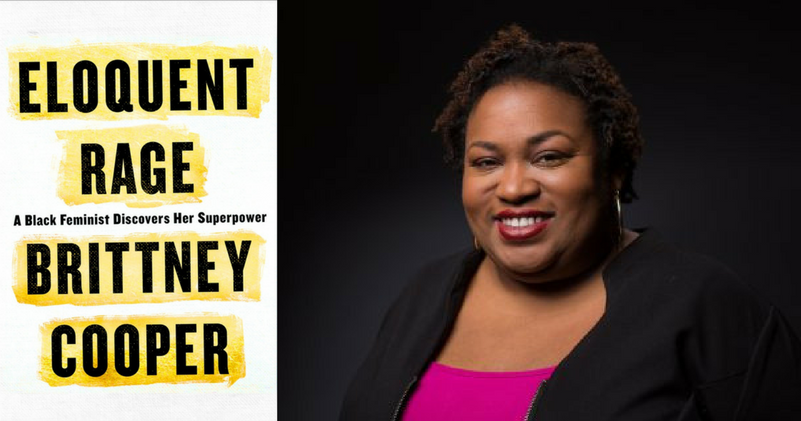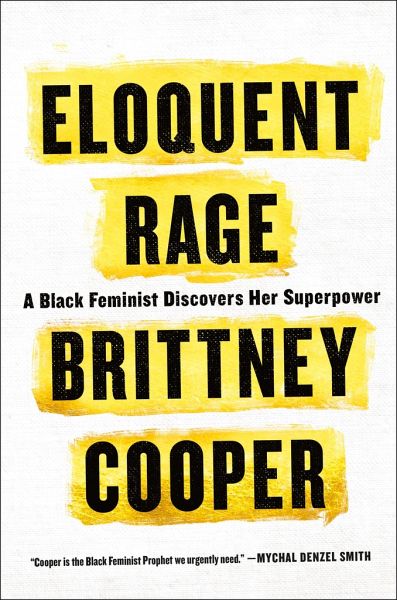

Cooper’s “Capital B, Capital F” for Black Feminism might also be for Big Feels, as she dives head first into them. Click To TweetĮloquent Rage would be a great title for a furious tirade, but that’s not what it is.

Our emotions aren’t an aside to macropolitical spheres rather, our desires, insecurities, and self-awareness are manifestations of it. The chapter epitomizes much of the strength in Cooper’s voice in the book overall-she perfects the hurt of her formative years into an artful marksman-like outrage in her feminist teachings and writings. I personally will be handing it out as stocking stuffers at my next gender studies conference. While the chapter will not be new information for feminist race scholars, it is a handy and accessible catchall for a consensus of ideas that women of color have espoused about the Women’s March and other current moments. Bush’s racist campaign scare tactics as evidence that the vast majority of white women’s political interests have been overwhelmingly race-loyal, and not really women’s interests at all. Wells’s Red Record, Iggy Azalea’s laughable attempt at hip hop, and George H.W. Cooper threads, among many other items, Ida B. Her chapter on “White Girl Tears” is where she shines best by doing what she does best: using both biography and scholarly lens to cook up popular culture, gender theory, and historical analysis into a biting indictment of white women’s anti-intersectionality-in this case the particular failings of white feminists to “gather” white women in the 2016 elections. She layers personal narratives around complicated childhood friendships, homegirl interventions, romantic loneliness, abusive fathering, and a violent murder attempt on her mother. Cooper is unapologetically reclaiming this right to rage.

Cooper opens with a thoughtful mea culpa about her own rage-an emotion that has been denied African American women and weaponized against them to violent ends. Recent waves of popular feminist writings, however, increasingly emphasize the obvious inverse of that equation, and Brittney Cooper’s Eloquent Rage is a deeply personal confessional where lived experiences deliver her to the doorstep of her feminist awareness. In Davis’s equation, our emotions aren’t an aside to macropolitical spheres rather, our desires, insecurities, and self-awareness are manifestations of it. I made audible affirmations when Angela Davis wrote that our interior lives-our emotions, our hearts, the places that masculinist movements deemed beyond the reach of the political discourse-are all highly informed by ideologies. I can check off all my contradictory feminist snags that were laid open in Manifesta, and Bad Feminist. I fucking love spa days, and Rihanna’s line of perfectly matched liquid foundations changed my yellow-undertoned life. One can now form a feminist politics out of spa day Groupons and $400 Rihanna tour tickets. Yet the phrase has been misused in a vast array of neoliberal me-ologies that border on self-indulgence, first-worldness, and the seductions of consumerist capitalism. Cathy Cohen Discusses Black Lives Matter Sarah Jacksonįull disclosure: I’m not always sold on invocations of “the personal is political”-a phrase of Audre Lorde and Combahee River Collective origins that, on its face, has become feminist common sense.Carroll Discusses Gender and Electoral Politics with Suzanna Walters Harris Discusses Gender and Gun Violence with Amy Farrell Michael Kimmel Discusses Toxic Masculinity with Lisa Wade.

Dolores Huerta Discusses Gender and Immigrant Rights with Durba Mitra.MacKinnon Discusses Sexual Harassment in the Age of #MeToo with Durba Mitra Cynthia Enloe, Agnieszka Graff, Ratna Kapur, and Suzanna Danuta Walters Discuss Gender and the Rise of the Global Right.Soraya Chemaly Discusses Feminist Rage with Carla Kaplan and Durba Mitra.Deborah Anker Discusses Gender and US Asylum Law with Aziza Ahmed.Byllye Avery Discusses the Past and Future of Reproductive Justice with Susan Reverby.Eesha Pandit and Paula Moya Discuss Activism and the Academy with Carla Kaplan and Suzanna Walters.Patricia Williams Discusses Rage and Humor as an Act of Disobedience with Carla Kaplan and Durba Mitra.Jennifer Fluri Discusses the Gender Politics of the US Withdrawal from Afghanistan with Sandra McEvoy.Susan Stryker Discusses Trans Studies, Trans Feminism, and a More Trans Future with V Varun Chaudhry.Rene Almeling, Sarah Richardson, and Natali Valdez Discuss Reproduction in the Age of Epigenetics.The Field of Women’s, Gender, and Sexuality Studies.Seven Necessary Sins for Women and Girls.Visibility and Visuality: Reframing Gender in the Middle East, North Africa, and Their Diasporas.Feminist Scholarship through Four Decades.Signs Resources on Abortion and Reproductive Justice.


 0 kommentar(er)
0 kommentar(er)
